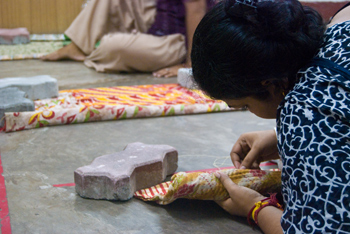Editor’s note: In June 2020, nearly three dozen people alleged that they saw or experienced “spiritual and psychological abuse" by Huertz; he posted a public apology on his webpage in which he acknowledged that some of his friendships with women “became inappropriate in nature.” A later investigation by an independent, third-party investigator on behalf of Gravity found no evidence of misconduct. Gravity is no longer in operation.
Chris Tomlin plays to packed houses in a spectacular stage show with video screens, lights and smoke. But at a recent concert at the Mid-America Center outside Omaha, the Dove Award-winning singer and worship leader dialed down the pyrotechnics to tell the story of Sari Bari, a Word Made Flesh project in India.
There was just a spotlight, quiet and Tomlin, holding a blanket.
Sari Bari grew out of years of workers from the Word Made Flesh mission organization listening to women in the commercial sex industry in the south of India. As WMF befriended the women they would ask, “What would freedom look like for you? How would you like to attain that?” Based on their responses, a WMF field director in Kolkata, Sarah Lance, and a former WMF staffer, Kristin Keen, came up with an idea to recycle used saris, the traditional clothing Indian women wear. The saris could be sewn into quilts or purses and sold. The required speed-sewing skills were hard-won, requiring six months or more to learn. During that time, WMF also offers therapy, math and literacy instruction. But once the women finish the training, they can leave the sex trade and experience something more like freedom.
And the bags and quilts they produced were beautiful -- so beautiful that the women realized they were making art, not just textiles. So they began to sign their work. In the sex trade these women often go by a false name that helps them disassociate from what they have to go through. But when they signed their artwork they used their real, given names.
The name Bari means “home” in Bengali, so the saris offer a new home. The blankets range in price from $38 to $72 and the bags from $15 to $25, and are available through their website. Sari Bari can’t keep up with demand for their products, especially with support from Tomlin, who hopes to fund space for another 75 women in addition to the 26 full-time workers and 23 trainees currently working for Sari Bari.
Tomlin got involved after Sari Bari caught the attention of Louie Giglio, founder of the Passion Conferences, the annual spiritual awakening gatherings for college students, where Tomlin performs.
Heuertz’s frenetic networking skills brought both organizations together: “Louie and I ironed the whole thing out over Facebook while I was in India a few years ago,” Heuertz said.
When Tomlin came to play near Omaha, Heuertz gave him a blanket, and the partnership came to a head in the silent arena that night.
Tomlin lowered the lights and talked. He took out the blanket Heuertz had given him, and held it “gently, tenderly, almost reverently,” Heuertz said. Then Tomlin looked for the tag and announced, “This blanket was made by a woman named Mukti.”
Chris Heuertz, WMF’s international executive director, sat in the 9,000-seat arena and sobbed. “She’s been called horrible things, lived in a dungeon, and here he is honoring her, in front of all these people,” he said.
That night, Heuertz called the Sari Bari community center -- “sounding like a crazy person” -- to find out more about Mukti, whose name, it turned out, means “freedom.”
“Could you tell her,” he said on the phone, “Could you tell her that her name was spoken with love?”
For Heuertz, that moment in which a once-nameless woman was recognized for good work displays the hope of Word Made Flesh.
“She’s not a cause, she’s not a label, she’s not a project,” Heuertz said. “But her name has been spoken in love in front of thousands, who are now praying for her on her way to freedom.”









